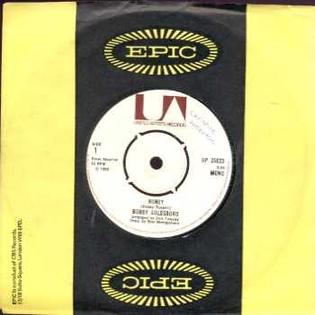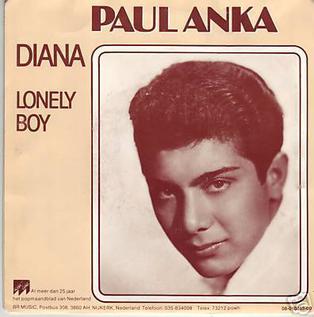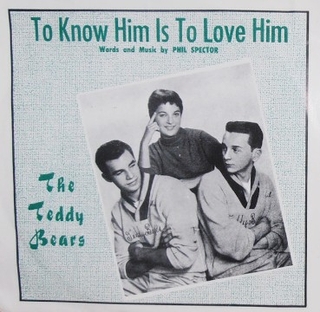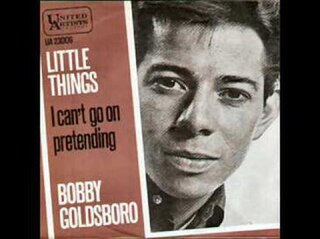Related Research Articles

"Honey", also known as "Honey (I Miss You)", is a song written by Bobby Russell. He first produced it with former Kingston Trio member Bob Shane, who was the first to release the song. It was then given to American singer Bobby Goldsboro, who recorded it for his 1968 album of the same name, originally titled Pledge of Love. Goldsboro's version was a hit, reaching No. 1 in several countries.

"Diana" is a song written and first performed by Paul Anka, who recorded it in May 1957 at Don Costa’s studio in New York City. Anka stated in his autobiography that the song was inspired by a girl named Diana Ayoub, whom he had met at his church and community events, and had developed a crush on. Session musicians on the record included George Barnes playing lead guitar, Bucky Pizzarelli playing the "Calypso" riff on guitar, Irving Wexler on piano, Jerry Bruno on bass, and Panama Francis on drums. The song was recorded in May 1957 at RCA Victor Studios in New York. Backup singers included Artie Ripp.
"Blue Velvet" is a popular song written and composed in 1950 by Bernie Wayne and Lee Morris. A top 20 hit for Tony Bennett in its original 1951 version, the song has since been re-recorded many times, with a 1963 version by Bobby Vinton reaching No. 1.

"To Know Him Is to Love Him" is a song written by Phil Spector, inspired by words on his father's tombstone, "To Know Him Was to Love Him." It was first recorded by the only vocal group of which he was a member, the Teddy Bears. Their recording spent three weeks at No. 1 on the Billboard Hot 100 chart in 1958, while reaching No. 2 on the UK's New Musical Express chart. Peter & Gordon and Bobby Vinton later had hits with the song, with its title and lyrics changed to "To Know You Is to Love You". In 1987, the song was resurrected by Dolly Parton, Linda Ronstadt, and Emmylou Harris, whose Trio recording topped the U.S. country singles chart.

"The Night Has a Thousand Eyes" is a song written by Benjamin Weisman, Dorothy Wayne, and Marilyn Garrett. It became a popular hit in 1962 for Bobby Vee and has had several cover versions over the years.

"Roses Are Red (My Love)" is a popular song composed by Al Byron and Paul Evans. It was recorded by Bobby Vinton, backed by Robert Mersey and his Orchestra, in New York City in February 1962, and released in April 1962, and the song was his first hit.
"There! I've Said It Again" is a popular song written and published by Redd Evans and David Mann in 1941. In early 1945, Vaughn Monroe and his Orchestra released Victor 20-1637, which reached the number one position on the Billboard's National Radio Airplay chart for five straight weeks, then no.2 for six more weeks, and a total run of 29 weeks. It finished 1945 as the no. 4 record of the year.

"Watching Scotty Grow" is a song written by country music singer-songwriter Mac Davis and recorded by Bobby Goldsboro in 1970 on his album, We Gotta Start Lovin. Davis recorded his version on his 1971 album, I Believe in Music.

"Forget Him" is a song written by Tony Hatch and released in 1963 by Bobby Rydell. The song spent 16 weeks on the Billboard Hot 100 chart, peaking at No. 4 on January 18, 1964, while it spent 14 weeks on the United Kingdom's Record Retailer chart, reaching No. 13. The song also reached No. 3 on Billboard's Middle-Road Singles chart, No. 3 on Canada's CHUM Hit Parade, No. 8 on the Irish Singles Chart, and No. 2 in Hong Kong.
"With Pen in Hand" is a song written by Bobby Goldsboro and first released on his March 1968 album, Honey. The song's lyrics address the subjects of divorce and losing custody of one's child, and are sung from the perspective of the parent who expects to be losing custody of their child, as they make a final plea to their spouse to reconcile before the divorce is finalized. "With Pen in Hand" has been a hit for multiple artists in the late 1960 and 1970s.
"See the Funny Little Clown" is a song written and sung by Bobby Goldsboro, which he recorded on October 17, 1963 and released on November 18, 1963. In 1964, the song spent 13 weeks on the Billboard Hot 100 chart, peaking at No. 9, while reaching No. 3 on Billboard's Middle-Road Singles chart, No. 10 on the Cash Box Top 100, and No. 30 on Canada's CHUM Hit Parade.
"Autumn of My Life" is a song written and sung by Bobby Goldsboro, which he released in 1968. The song spent 9 weeks on the Billboard Hot 100 chart, peaking at No. 19, while reaching No. 2 on Billboard's Easy Listening chart, No. 12 on Record World's "100 Top Pops", No. 1 on Record World's "Top Non-Rock" chart, No. 11 on Canada's RPM 100, No. 2 on RPM's Country Chart, and No. 18 on Australia's Go-Set National Top 40.

"Little Things" is a song written and sung by Bobby Goldsboro, which he recorded on November 19, 1964, and released on November 24, 1964. The song reached No. 13 on the Billboard Hot 100.
"I'm a Drifter" is a song written and sung by Bobby Goldsboro, which he released in 1969. The song spent 10 weeks on the Billboard Hot 100 chart, peaking at No. 46, while reaching No. 14 on Billboard's Easy Listening chart, No. 22 of Billboard's Hot Country Singles chart, No. 44 on the Cash Box Top 100, No. 36 on Canada's RPM 100, and No. 9 on RPM's Adult Contemporary chart.
"Whenever He Holds You" is a song written and sung by Bobby Goldsboro, which he released in 1964. The song spent eight weeks on the Billboard Hot 100 chart, peaking at No. 39, while reaching No. 13 on Billboard's Pop-Standard Singles chart, No. 41 on the Cash Box Top 100, and No. 28 on Canada's CHUM Hit Parade.
"Please Love Me Forever" is a song written by John Malone and Ollie Blanchard. The song was originally released by Tommy Edwards in 1958. Hit versions were later released by Cathy Jean and the Roommates in 1960 and Bobby Vinton in 1967.
"Clinging Vine" is a song released by Bobby Vinton in 1964. The song spent 8 weeks on the Billboard Hot 100 chart, peaking at No. 17, while reaching No. 2 on Billboard's Pop-Standards Singles chart, No. 14 on the Cash Box Top 100, No. 11 on Canada's RPM "Top 40-5s", and No. 9 on Canada's CHUM Hit Parade.
"My Heart Belongs to Only You" is a song written by Frank Daniels & Dorothy Daniels. Bette McLaurin and June Christy both released versions of the song in 1952. In 1953, the song reached No. 27 on Cash Box's chart of "The Nation's Top 50 Best Selling Records", in a tandem ranking of June Christy, Bette McLaurin, these versions were marked as bestsellers.
"Long Lonely Nights" is a song that was originally released by Lee Andrews & the Hearts in 1957. Hit versions were also released by Clyde McPhatter, later in 1957, and Bobby Vinton in 1965. The song was written by Lee Andrews, though Larry Brown, Doug Henderson, and Mimi Uniman were given songwriter credit as well, in a practice that was common at the time.
"He Understands Me" is a song released in 1963 by Teresa Brewer. The song was a hit single for Johnny Tillotson in 1964, retitled "She Understands Me", and Bobby Vinton in 1966, retitled "Dum-De-Da".
References
- ↑ Molly - By: Bobby Goldsboro, MusicVF.com. Accessed September 21, 2015
- 1 2 Horstman, Dorothy (1996). Sing Your Heart Out, Country Boy, Country Music Foundation. p. 277.
- 1 2 "Bobby Goldsboro Chart History (Hot 100)". Billboard.
- ↑ Bobby Goldsboro - Chart History - Adult Contemporary, Billboard.com. Accessed September 21, 2015
- ↑ "Middle-Road Singles", Billboard , January 26, 1963. p. 44. Accessed September 21, 2015
- ↑ Cash Box Top 100, Cash Box , February 2, 1963. p. 4. Retrieved April 18, 2017.
- ↑ Bickhart, Jim (October 5, 1974). "Watching Bobby Grows: A Decade of Hits". Billboard. pp. BG-3, 4, 8.
- ↑ "Bobby Goldsboro Chart History (Adult Contemporary)". Billboard.